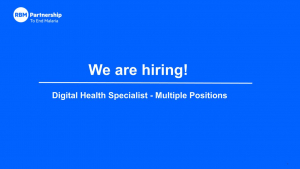Application period: 15-Feb-2022 to 09-Mar-2022
"Qualified female candidates are strongly encouraged to apply."
The Digital Health Specialist shall work for the UNOPS/RBM to facilitate and support countries with issues related to the development and/or scale up of digital platforms for malaria intervention campaigns or multi-disease campaigns, malaria or multi-disease surveillance and other interventions. The countries to be supported present highly complex technical, epidemiological and political contexts for implementation of malaria control and elimination. At the same time, significant increased investment in digital health (digitization of campaigns) is anticipated in the coming years, for example, through mechanisms such Global Fund’s C19RM. This context significantly enhances the complexity of malaria program implementation and requires senior and experienced consultants, able to command the respect of senior government officials and partners. The implementation support from the Digital Health Specialist will support issues related to the introduction or scale up of digital health platforms for malaria intervention campaigns, such as insecticide-treated nets (ITN), indoor residual spraying (IRS), seasonal malaria chemoprevention (SMC), and surveillance or other interventions where additional capacity and expertise is needed and cannot be found among in-country partners, following WHO guidance and country standards/policy, and working in collaboration with strategic partnerships (e.g. UNICEF DICE, Bill and Melinda Gates Foundation and others).
The Digital Health Specialist is expected to have expertise in the assessment, development, governance and implementation of digital health tools and technologies, particularly in the context of malaria prevention campaigns or similar campaign-style service delivery and malaria surveillance. In-depth knowledge of the various existing implementations of digital health tools and technologies for digital campaigns (malaria and other diseases) and malaria surveillance (e.g. DHIS2) is also required. In addition, the consultant is expected to have a clear understanding of relevant WHO normative guidance on digital health, as well as broader global guidance, developments, partnerships and initiatives in the digital health space. In addition, the assignment requires highly developed negotiation skills and a proven track record in achieving consensus across multiple stakeholders. The consultant will be expected to visit the countries as necessary during the support period.
The position is homebased with significant duty travel required. Assignments could include, but are not limited to the following and could be for a particular intervention area or across interventions:
A. Programmatic area
-
Development and/or scale up of a digital platform for malaria prevention campaigns (ITNs, IRS, SMC) or multi-disease campaigns, including malaria. This could include partial digitization (such as implementation of mobile payments) or all aspects of a campaign.
-
Development and/or scale up of digital malaria (or multi-disease) surveillance systems (facility level, community level).
-
Development of common georegistries of core spatial data layers relevant to GIS-based macro-planning and micro-planning of campaigns and malaria surveillance, including but not limited to georeferenced master lists/registries of health facilities (public and private), community health workers, mobile outreach sites, administrative boundaries, settlements, household footprints and target populations.
-
Assess the design, governance and implementation of existing digital health platforms implemented in-country, assess country capacity, identify challenges and recommend solutions.
-
Develop detailed strategies, operational and financing plans, as well as risk assessment and mitigation plans for the roll out of digital health platforms;
B. Monitoring and Evaluation
-
Develop training, supervision, monitoring and evaluation protocols to support, monitor and evaluate implementation.
-
Review existing support and conduct partnership mapping of current activities, resources and anticipated changes.
-
Review cost and efficiencies of programs.
-
Lead the fieldwork and analysis to develop an investment case for digital platforms, for example for integration of malaria within national digital health efforts (platforms, strategy and policy).
-
Lead and/or support on review and validation of the comprehensive programmatic and/or financial gap analysis for a particular intervention area;
C. Coordination
-
Lead high-level discussions with senior management, partner representatives and other key stakeholders to broker consensus on any of the above intervention areas.
-
Undertake a technical review of chosen strategies and interventions to ensure that they are technically sound and in line with WHO normative guidance, feasible to implement and will achieve sufficient impact.
Monitoring and Progress Controls
Key Deliverables:
-
To be determined based on the specific assignment, possible examples:
-
Operational plan for roll out for full digitization of a malaria campaign
-
Guidelines for implementing a digital malaria surveillance system
-
Final report to the CRSPC analyzing support provided including recommendations for improving future support to countries.
-
Write and submit a report to the CRSPC outlining in detail the support provided including suggesting lessons for future support.
This advertisement is aimed at creating a pool of qualified candidates. If successful, you will be offered a retainer contract allowing you to work on a consultancy basis.
